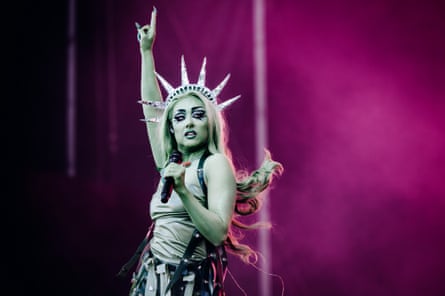The album at UK No 1 this week is titled The Rise and Fall of a Midwest Princess – though for its creator, breakthrough pop star Chappell Roan, the past year has been all rise and no fall.
When the Missouri-born 26-year-old released her debut album last September, it marked the beginning of a slow-burning second act in pop. In her late teens, she had been signed as a downbeat songwriter by Atlantic and subsequently dropped. The experience prompted her to cultivate an outre persona that allowed the queer musician born Kayleigh Amstutz to express everything she had once repressed, growing up in a Christian community. “I grew up thinking being gay was bad and a sin,” she told the Guardian last year. “I went to the gay club once and it was so impactful, like magic. It was the opposite of everything I was taught.” She then hustled her way – via stints back home working in a drive-thru doughnut shop – to a deal with Island.
Roan draws from the mega-pop of the 2010s, from Lady Gaga to Taylor Swift – then laces it with sexually frank asides and lavish doses of camp, and performs it with a maximalist, absurd aesthetic indebted to drag, John Waters and Freddie Mercury.
What first resonated with queer gen Z fans on TikTok in particular has since become a more widespread phenomenon – or a Femininomenon, as the album’s riotous opening track would have it. At the Lollapalooza festival in Chicago last weekend – where she performed in a lucha libre outfit, surrounded by female bodybuilders – Roan was upgraded to a prime slot and drew what organisers estimated to be the event’s biggest crowd ever.
Just a year ago, US music industry magazine Billboard reported: “Pop stars aren’t popping like they used to – do labels have a plan?” No one had seriously broken through since Olivia Rodrigo in January 2021. But this summer has been ruled by a fresh pop cohort: Brat mastermind Charli xcx, Espresso singer Sabrina Carpenter and Roan. Where the former two have been building for a decade, Roan is essentially brand new.
Her rise, said NPR music editor Hazel Cills, came in part as a result of Roan’s ability to operate in so many different spaces, from serving her core audience on TikTok, to finding new fans when she supported Rodrigo on tour – they share a producer in Daniel Nigro – to spectacular performances on NPR’s Tiny Desk concert series and The Tonight Show Starring Jimmy Fallon, then festival stages. “She’s been building up her presence in all of these different spheres,” said Cills. In April, Roan released a new, non-album single, Good Luck, Babe!, about her romantic travails with a closeted girl. “It’s her biggest and best song so far, it can do really well on television, at festivals – that catapulted her in a much bigger way,” said Cills.
And where many pop stars who made their name on TikTok struggle to translate their music to the stage, Roan’s panache for performance has set her apart: she has played dressed as the Statue of Liberty – at a festival where she said she had turned down an invitation to perform at a White House Pride event until they truly offered “liberty, justice and freedom for all” – as well as drag queen Divine and Marie Antoinette, and themes her shows to inspire audience costumes.

“For the past 10 years, alternative pop has been very bedroom oriented,” said Cills. “Post-Lorde, Halsey, Clairo, even Rodrigo – they’re all indebted to singer-songwriter traditions and making quiet, minimalist music.” From Yorgos Lanthimos’s 2023 film Poor Things to British band the Last Dinner Party and Roan, baroque aesthetics are now everywhere. “There’s been a huge shift towards music that should exist outside the bedroom,” said Cills. Young audiences are yearning for the theatricality of early 2010s pop stars that they were too young to experience, something the pandemic made impossible. “Chappell is catering to all these desires and can take that mantle.”
Roan has been explicit about her debt to drag. She introduces herself as “your favourite artist’s favourite artist” – a riff on RuPaul’s Drag Race winner Sasha Colby calling herself “your favourite drag queen’s favourite drag queen” – and has said that becoming a drag version of herself, otherwise an introverted video gamer, has allowed her to be “whatever I want”. Her song Pink Pony Club draws from the aforementioned night she experienced at West Hollywood club the Abbey. “Fans have been visiting just to experience the place that inspired the song,” said club owner Tristan Schukraft, “and the dancefloor goes wild whenever we play her music.” (They also added a Pink Pony cocktail to the menu.)
At Roan’s headline shows, she invites drag artists to support, and has raised money for LGBTQ+ supporting charities such as the New York City-based For the Gworls, Kaleidoscope Trust in the UK, and GLO Center in the Ozarks, Missouri (she also provides a scholarship scheme offering tickets to fans on low incomes). At Heaven nightclub in London in December, drag queen Bones, the self-styled Queen of Soho, was selected after Roan’s team put out a call for performers. “It was one of the best crowds I’ve ever had,” said Bones.
The history of pop is littered with artists exploiting drag without necessarily respecting the culture or benefiting the performers. Roan feels different, said Bones. “I know American queens who know her as the girl who used to come to the club and support the queens. Like Lady Gaga, you know exactly who she is – there’s a certain authenticity from the get-go.”
You can’t move at drag shows now, Bones said, for queens doing Roan’s songs. “Every song on the album is so great and sounds so different, or people are doing the same song in a completely different look – it’s so cool.” At a time when drag artists are being persecuted in the US and the UK, Roan’s success felt particularly striking, said Bones. “Ironically, the protesters are probably driving to whatever stupid protest they’re doing with Good Luck, Babe! on the radio.”
Roan’s success had broken beyond the queer community, she said, because “it’s just that little bit of camp that everybody kind of loves – she has that casual star quality.”
Many pop stars who have experienced viral fame experience burnout – UK singer-producer PinkPantheress, who rose through TikTok, announced last week that she was cancelling all forthcoming dates to focus on her wellbeing – or are unable to translate one hit song into a career. For Cills, Roan’s “serious stage presence and technical talents, her ability to establish herself on social media and in more traditional spaces, signal sustainability”. With six songs on the US Hot 100 this week, in addition to that probable UK No 1, Roan’s rise looks unstoppable.
Source: theguardian.com

















